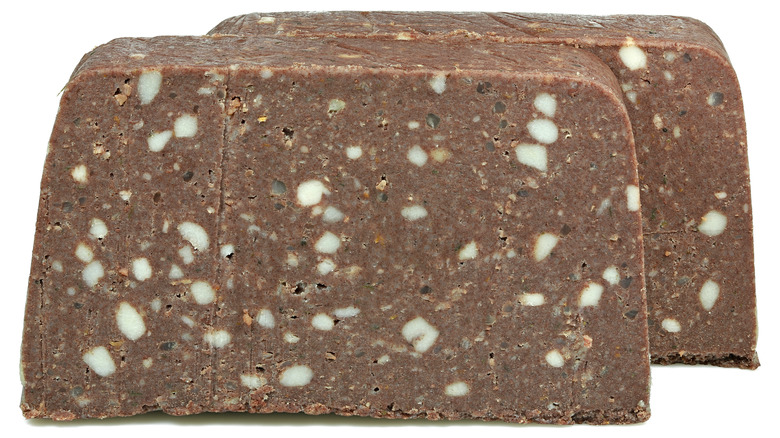How Scrapple Might Have Led To The Creation Of Labor Day
If you've never heard of scrapple, you're probably not from Pennsylvania. The aptly-named congealed loaf, which blends together meat scraps, milled grains, and spices, came to the Keystone State by way of German Immigrants in the 19th century, commonly referred to as the Pennsylvania Dutch (via the Encyclopedia of Greater Philadelphia). Combining their German traditions of saving pork scraps with New World ingredients like cornmeal, spices, and buckwheat, the Pennsylvania Dutch created a loaf that could be sliced, pan-fried, and covered in syrup, making it the perfect breakfast to fuel up for a long day.
Scrapple may not be as popular nationwide as its more recognizable cousin, Spam, but you can still find it in delis and grocery store freezer sections around its original stomping grounds. If you're looking for a vetted brand, stores across the Northeast still sell Habbersett scrapple, which has been in production since 1863. For all of the history surrounding the makings of scrapple, an urban legend also has it that the dish was the impetus for a far more digestible American tradition: Labor Day.
A day to enjoy your hard-earned scrapple
If this is the first time you're hearing of scrapple, then it's almost certainly the first you're hearing of Rasher Liverburg, who may or may not have made his living shoveling liver for the Philadelphia plant Panhas Packers in the late 1800s, according to Thrillist. As the urban legend goes, Liverburg became the head of quality control at the scrapple plant by 1879, and was also appointed as the secretary of the Scrapple Eaters Unionfindings (via What Is Scrapple!).
Even though the Panhas Packers was the biggest name in the Philadelphia scrapple business, What Is Scrapple! claims that Liverburg could seldom get his hands on a brick of the stuff at the end of each workday. Fed up and hungry for scrapple, Liverburg allegedly asked his supervisors at the plant to enact an annual "Enjoy Your Scrapple Labor Day" so he and his fellow hard-working employees could enjoy the fruits of their labor. Legend has it that Liverburg's efforts inspired larger labor unions in New York and other big cities, sparking the nationwide worker strikes that gave way to the eight-hour workday and the enactment of Labor Day as a legal holiday in 1894.
Labor Day's mainstream history is scrapple-free
Though entertaining, the fact that the legend behind "Enjoy Your Scrapple Labor Day" revolves around a liver-shoveler named Liverburg clouds the veracity of the story. But there's nothing wrong with enjoying a plate of scrapple on the first Monday of September, and we'd be more inclined to go hog-loaf wild on November 9, which is officially National Scrapple Day, per the Farmer's Almanac.
Unless you're a firm believer in the culture-shifting power of scrapple, you can spend next year's Labor Day recalling the holiday's more thoroughly recorded history summarized by the U.S. Department of Labor. As for what to eat, most people forgo historic symbolism in place of dishes that star end-of-summer produce like corn on the cob, kebabs on the grill, and slices of juicy watermelon. And if you feel compelled to sneak some fried scrapple into the mix, you have our blessing.


